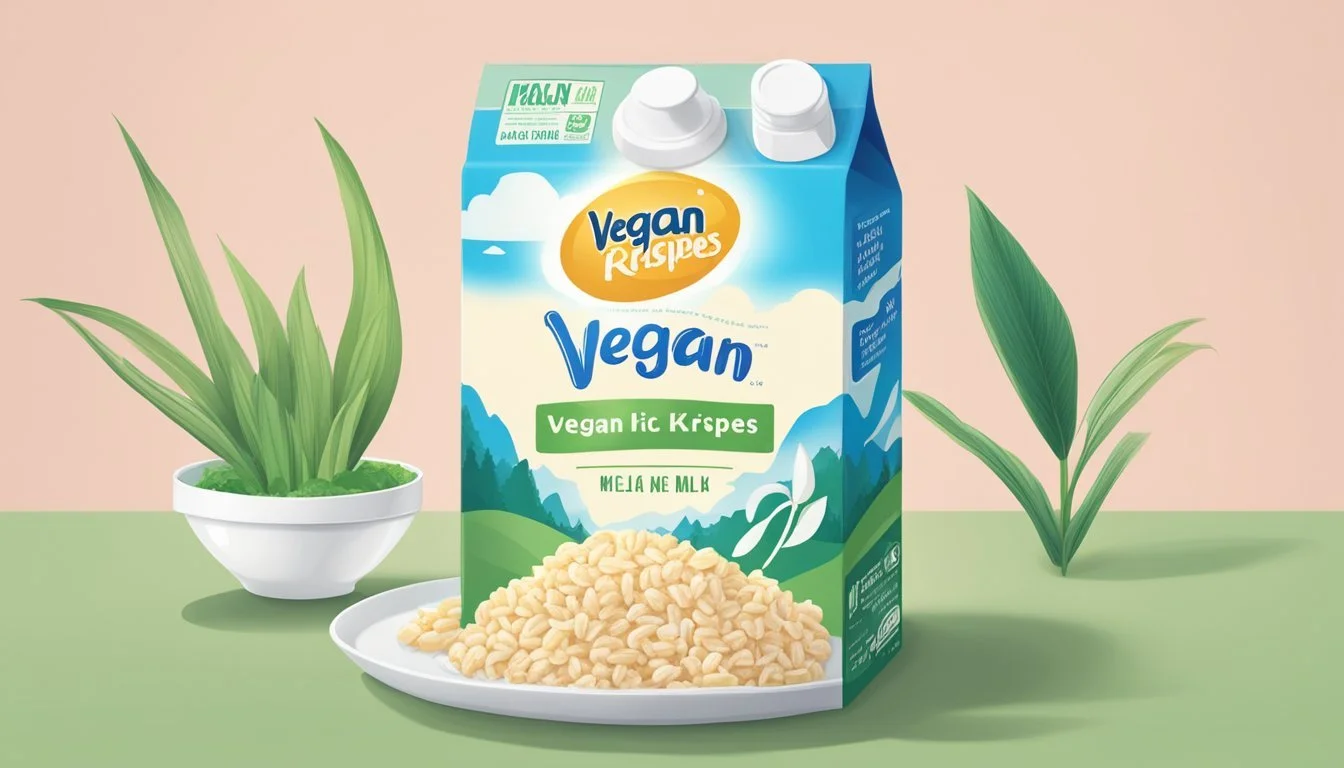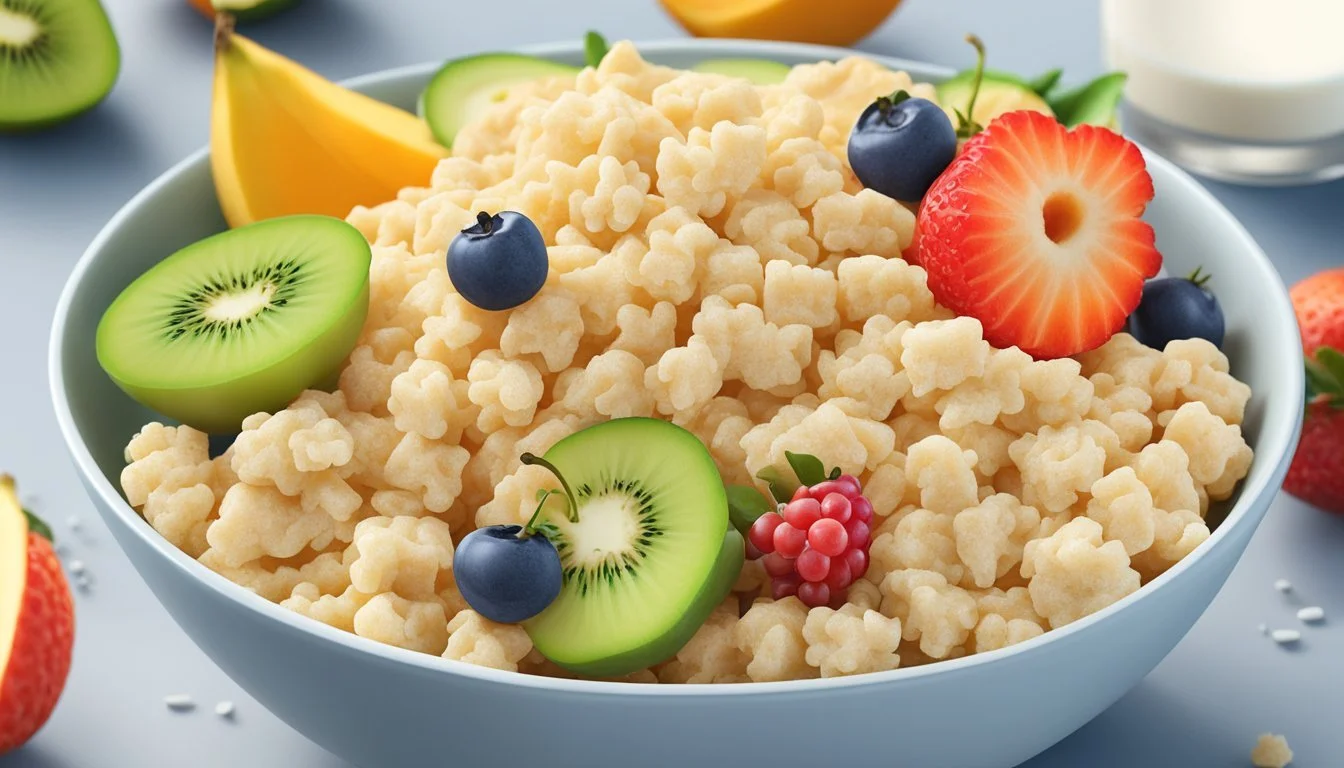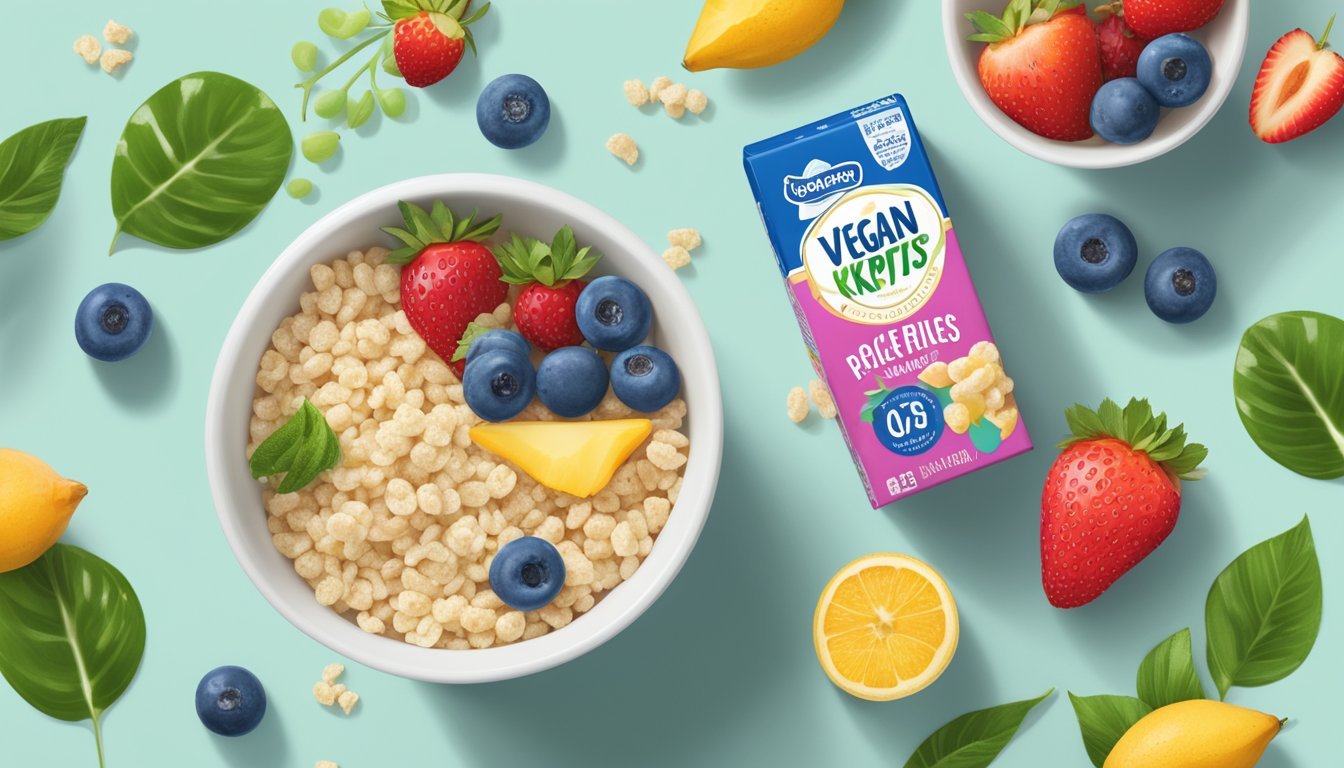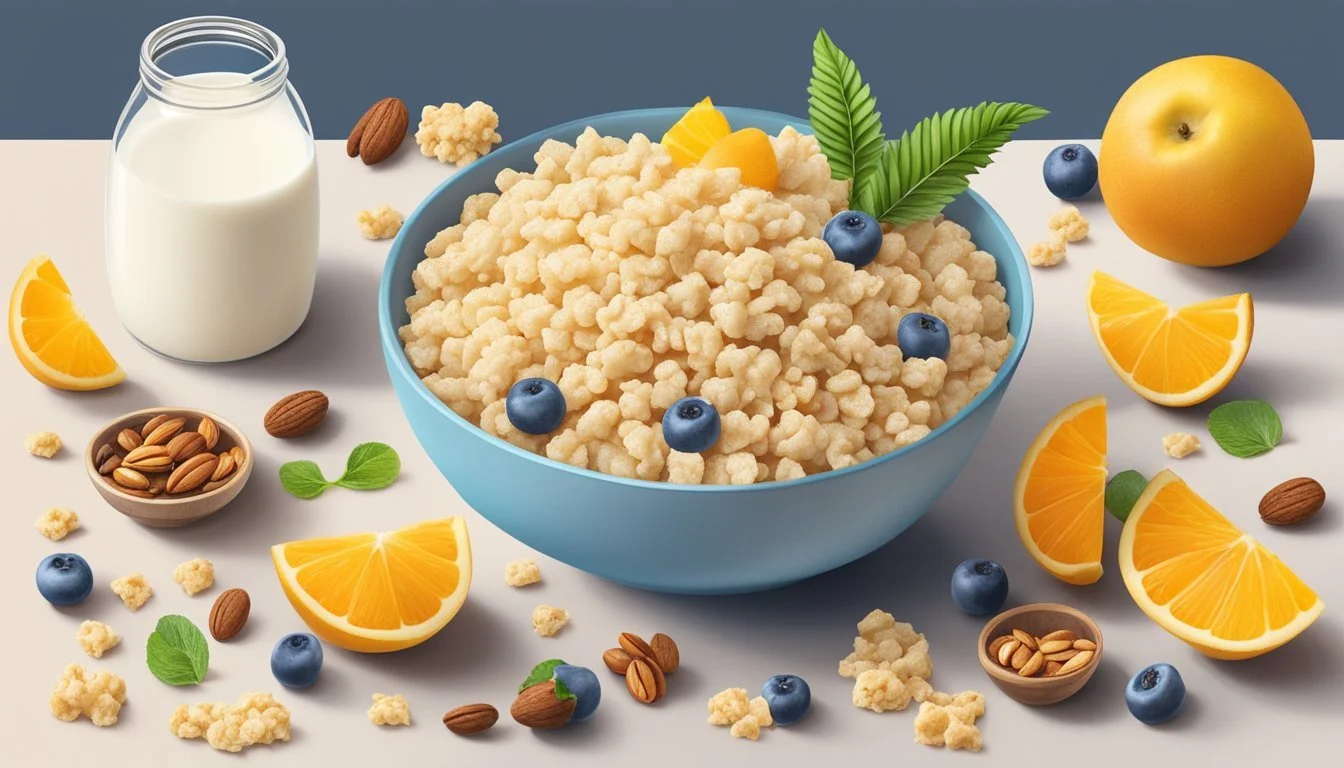Are Rice Krispies Vegan?
Unveiling the Ingredients List
When exploring the realm of vegan-friendly foods, a common question that arises pertains to the vegan status of popular breakfast cereals, such as Rice Krispies. At a glance, Rice Krispies might appear to be vegan, as they are primarily made from rice, which is a plant-based ingredient. However, their vegan status is not just about the main ingredient but also involves other components and additives used in the manufacturing process.
Rice Krispies, a well-known cereal produced by Kellogg's, are typically fortified with vitamins and minerals to enhance their nutritional value. Among these added nutrients is vitamin D3, which is often derived from animal sources, specifically lanolin extracted from sheep's wool. This inclusion of an animal-sourced ingredient is a crucial determinant that impacts the vegan status of Rice Krispies, making them non-vegan according to most standards within the vegan community.
While the base ingredient may align with a plant-based diet, consumers seeking vegan options must pay close attention to the details on nutrition labels. It's important to note that while Kellogg's Rice Krispies may not be vegan, there may be other puffed rice cereals in the market that do not include animal-derived ingredients, offering viable alternatives for those adhering to a strict vegan diet.
Rice Krispies Ingredients Overview
In assessing whether Rice Krispies are vegan, a closer examination of their ingredients is essential. This section delves into the core components, the range of vitamins used for fortification, and potential non-vegan additives.
Core Ingredients
Rice Krispies cereal, a popular breakfast choice, primarily consists of simple, plant-based ingredients. The foundation of the cereal is as follows:
Rice: The main ingredient, providing the cereal's structure and crisp texture.
Sugar: Added for sweetness.
Malt flavor: Contributes to the cereal's distinct taste.
Salt: Enhances flavor.
Vitamins and Fortification
Kellogg's Rice Krispies are fortified with vitamins and minerals, which include:
Vitamin A palmitate
Ascorbic acid (Vitamin C)
Alpha-tocopherol acetate (Vitamin E)
Niacinamide
Pyridoxine hydrochloride (Vitamin B6)
Riboflavin (Vitamin B2)
Thiamin hydrochloride (Vitamin B1)
Folic acid
Vitamin B12 (as cyanocobalamin)
Iron (ferric phosphate) These fortifications serve to enhance the nutritional profile of the cereal.
Potential Non-Vegan Additives
A contentious ingredient for those following a vegan diet found in Rice Krispies is:
Vitamin D3: Sourced from lanolin, an oil derived from sheep's wool, making it non-vegan. Its presence is paramount to consider for strict vegans evaluating the cereal's suitability for their diet.
Understanding Veganism
In this section, we delve into the facets of veganism, from dietary choices that exclude animal products to the broader lifestyle and product labeling that informs vegan-friendly consumption.
Vegan Diet Fundamentals
A vegan diet excludes all animal products. This means vegans do not consume:
Meat: Includes beef, pork, poultry, and seafood.
Dairy: Milk, cheese, and other products derived from animal milk.
Eggs: From chickens or any other birds.
Honey: Produced by bees.
Vegans opt for plant-based alternatives and whole foods, emphasizing grains, legumes, fruits, vegetables, nuts, and seeds in their diet.
Common Non-Vegan Ingredients
Apart from obvious items like meat and dairy, many products contain less apparent non-vegan ingredients. Some common ones include:
Gelatin: Often derived from collagen obtained from various animal body parts.
Casein: A protein commonly found in milk.
Lanolin: An oil-like substance derived from sheep's wool, sometimes used in vitamin D3 fortification.
Bone Char: Animal bones processed at high temperatures, used to refine cane sugar.
Vegans must scrutinize product labels to avoid these hidden animal-derived substances.
Vegan Lifestyle and Labels
Veganism extends beyond diet to a lifestyle that seeks to eliminate all forms of animal exploitation and cruelty. This includes avoiding:
Clothing: Made from leather, wool, silk, or down.
Cosmetics: Tested on animals or containing animal-derived ingredients.
Labels such as "Certified Vegan" or "100% Plant-Based" ensure products meet vegan standards. However, some products labeled as "vegan" might still undergo processing such as bone char filtration, demonstrating the complexity of achieving a fully vegan lifestyle.
Rice Krispies and Vegan Concerns
The iconic cereal, Rice Krispies, raises questions in the vegan community due to certain ingredients and cross-contamination risks. These concerns mainly revolve around the source of Vitamin D3, the use of malt flavoring and bone char, and potential cross-contamination during production.
Vitamin D Source Controversy
Rice Krispies are fortified with vitamin D3, which is often derived from lanolin—a substance obtained from sheep's wool. Since lanolin is of animal origin, it renders the cereal non-vegan. This inclusion is significant considering that vitamin D is an essential nutrient, but its animal-derived form is at odds with a vegan diet.
Malt Flavoring and Bone Char
Malt flavoring is an ingredient that may pose issues for vegans. Though derived from barley, the concern lies in potential cross-contact with dairy during production. Additionally, the cereal's sugar content may be processed with bone char—charcoal made from animal bones—to achieve a white color. Both these factors can compromise the vegan status of Rice Krispies.
Cross-Contamination Risks
Cross-contamination can occur if the cereal is produced on equipment shared with non-vegan products that contain dairy, gelatin, or other animal products. For strict vegans, even the slightest risk of cross-contamination is enough to avoid a product, making the vegan status of Rice Krispies questionable.
Vegan Alternatives to Rice Krispies
For those seeking plant-based options, there are several vegan-friendly alternatives to Rice Krispies, ranging from homemade recipes to store-bought brands. These alternatives not only cater to vegan diets but also often address gluten-free needs.
Homemade Vegan Cereal Recipes
Recipe 1: Brown Rice Cacao Crisps
Ingredients:
4 cups brown rice cereal (ensure it's gluten-free if necessary)
1/2 cup cacao powder
1/2 cup maple syrup or agave nectar
1/4 cup coconut oil, melted
Method: Mix the cacao powder with the syrup and oil, then stir into the brown rice cereal until evenly coated. Spread on a baking sheet and bake at a low temperature until crisp.
Recipe 2: Vegan Rice Krispie Treats
Ingredients:
4 cups vegan gluten-free rice cereal
2 tablespoons coconut oil
1/3 cup vegan marshmallows
Method: Melt the coconut oil in a saucepan, add marshmallows, and stir until melted. Mix in the cereal and press into a pan to cool and set before cutting into squares.
Commercial Vegan Cereal Brands
Nature’s Path Organic Crispy Rice Cereal
A certified gluten-free and vegan-friendly cereal, this brand provides a similar texture and taste to traditional Rice Krispies.
Whole Foods Market 365 Brand
Offers a variety of vegan cereals which may include rice-based options that are suitable for those looking for an alternative to Rice Krispies.
To find these and other vegan cereal options, consumers can check local health food stores or larger supermarkets that carry specialty diet items.
Vegan Breakfast Tips
When selecting a vegan cereal, it's essential to check for non-vegan ingredients such as Vitamin D3 or honey. Additionally, for individuals with gluten sensitivities, ensuring the product is labeled gluten-free is crucial. Consumers looking for added convenience can also find ready-to-eat vegan rice cereal snacks at many health stores. It's always beneficial to explore different brands and flavors to find one’s personal preference within vegan-friendly alternatives.
Making Vegan Rice Krispies Treats
When creating vegan Rice Krispies treats, the focus is on replacing non-vegan ingredients with plant-based alternatives without compromising on the classic treat's beloved taste and texture.
Ingredients and Substitutions
Ingredients for Vegan Rice Krispies Treats:
Vegan Butter: A foundational element for achieving the rich taste and keeping the marshmallows from sticking.
Vegan Marshmallows: They melt differently than traditional marshmallows but are essential for the right consistency.
Crispy Rice Cereal: The main component, ensuring the treat's signature crunch.
Vanilla Extract: For depth of flavor, usually a teaspoon is sufficient.
Optional Ingredients:
Nut Butter can be added for a protein boost and depth of flavor.
Brown Rice Syrup can serve as an alternative binding agent for an even stickier result.
Non-Vegan Ingredient Vegan Substitute Butter Vegan Butter Marshmallows Vegan Marshmallows Crisp Rice Cereal Gluten-Free, Vegan Option
Substitutions:
Nut Butter: Tahini, almond butter, or peanut butter can replace vegan butter for a nuttier flavor profile.
Brown Rice Syrup: If vegan marshmallows are unavailable, brown rice syrup can be used to create a similar sticky texture.
Preparation and Storage
Preparation:
Line a baking pan with parchment paper and lightly grease it to prevent sticking.
Melt vegan butter over medium-low heat in a large pot.
Add vegan marshmallows to the pot, stirring continuously until melted.
Remove from heat and stir in the vanilla extract.
Gently fold in the crispy rice cereal until well coated.
Transfer the mixture to the prepared baking pan, pressing it down into an even layer.
Allow the treats to cool at room temperature or chill in the fridge to set, which typically takes about 30 minutes to an hour.
Storage:
Store the treats in an airtight container to maintain their texture.
Keep at room temperature for soft treats or in the fridge for a firmer texture.
Best enjoyed within a few days for optimal freshness.
Nutritional Profile of Rice Krispies
The nutritional profile of Rice Krispies reveals a simple composition primarily consisting of carbohydrates and fortified vitamins and minerals. This section delves into the specifics of their macronutrient and micronutrient content.
Carbohydrates and Sugars
Rice Krispies are predominantly composed of carbohydrates, largely from rice and sugar. The cereal offers a source of quick energy due to its high carbohydrate content. However, it also contains added sugars, which contribute to the total carbohydrate count.
Carbohydrates: Predominantly from rice
Sugars: Added for sweetness
Protein and Fiber Content
Rice Krispies have minimal protein and fiber per serving. These nutrients are vital for bodily functions and overall health, but Rice Krispies are not a significant source of either.
Protein: Low amounts
Fiber: Minimal content
Vitamins and Minerals
Rice Krispies are fortified with essential vitamins and minerals to enhance their nutritional value. Key vitamins include B1 (thiamin hydrochloride), B2 (riboflavin), B6 (pyridoxine hydrochloride), B12, niacinamide, and vitamin D3, among others. The cereal also contains iron, a crucial mineral for blood health.
Vitamins: Fortified with B1, B2, B6, B12, niacinamide, and vitamin D3
Minerals: Source of iron (ferric phosphate)
Sodium: Present in small amounts
Each of these vitamins and minerals plays a role in maintaining various body functions, from metabolism to immune system support.
Rice Krispies in Different Regions
Rice Krispies, a popular cereal brand manufactured by Kellogg's, exhibits variations in its vegan status depending on the region in which it is sold. Awareness of these differences becomes essential for consumers with dietary restrictions.
United States Market
In the United States, Rice Krispies are widely available in stores such as Walmart. However, the U.S. version of Rice Krispies is not vegan due to the inclusion of Vitamin D3, which is derived from animal sources, commonly lanolin from sheep's wool. Consumers seeking plant-based options often turn to generic versions; however, they should scrutinize the ingredients as the issue with Vitamin D3 can be pervasive.
United Kingdom Variations
Across the United Kingdom, supermarkets like Tesco and Sainsbury's stock Rice Krispies, and similar to the U.S. counterpart, UK Rice Krispies generally contain vitamin D3 from animal origin. The UK's strict labeling laws ensure customers are well informed about the ingredients. Potential variations in the recipe could mean different British versions might or might not accommodate a vegan diet.
Global Availability
Globally, the availability and ingredients of Rice Krispies can vary widely. While the base of the cereal—typically rice, sugar, and malt flavoring—is vegan, the vitamin fortification, which often includes Vitamin D3, tends to be the disqualifying factor for vegans. Consumers are encouraged to check the labeling where they live or contact the manufacturer directly for the most accurate information regarding the vegan status of their local Rice Krispies.
Environmental and Ethical Considerations
In the context of veganism, environmental and ethical considerations shape the discourse around products like Rice Krispies. Consumers increasingly factor in sustainability and animal welfare when making their dietary choices.
Impact of Cereal Production
Cereal production has a notable environmental footprint, stemming from agricultural practices to factory processing. The production process often involves:
Water usage: Large amounts of water for irrigation of crops.
Carbon emissions: Greenhouse gases emitted by farm machinery and transportation.
On the sustainability front, companies may adopt methods such as reduced water usage or eco-friendly packaging to lessen their environmental impact.
Ethical Sourcing and Animal Welfare
Ethical sourcing is a significant concern for ethically-conscious consumers, who seek transparency in how ingredients are procured. The presence of vitamin D3 in Rice Krispies, often sourced from lanolin—a substance obtained from sheep's wool—raises questions about animal welfare. Strict vegans argue that exploitation of any animal product is unethical, pushing for alternatives like plant-derived vitamin D2 or D3 from lichen.
For Rice Krispies to be considered truly vegan and ethically sourced, key changes would need to be implemented in both the sourcing of vitamin D3 and the transparency of ingredient origins.
Conclusion and Summary
When assessing whether Rice Krispies are vegan, one discovers that the primary ingredients—rice, sugar, and salt—are plant-based. However, Vitamin D3, which is derived from animal sources such as lanolin from sheep's wool, is a non-vegan component found in Rice Krispies. The presence of this ingredient means that Rice Krispies cannot be deemed fully vegan.
While the cereal itself raises questions, additional products like Rice Krispies Treats complicate the vegan assessment. The treats also contain marshmallows, which include gelatin, an animal-derived product, thus making them unsuitable for a vegan diet.
Consumers seeking a balanced diet and interested in vegan options need to scrutinize product ingredients and processing methods. The use of bone char in refining sugar, for instance, may also affect the vegan status of a food product.
In terms of consumption in moderation, whether a product is vegan or not, it is essential for individuals to consider their overall dietary needs and align them with their ethical choices.
In summary, Rice Krispies contain ingredients not in alignment with a vegan lifestyle, and individuals adhering to this diet need to consider alternate cereals that are certified vegan.








